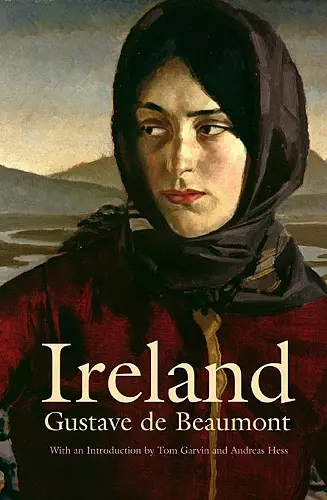Ireland
Social, Political, and Religious
Gustave de Beaumont author W C Taylor editor Andreas Hess editor Tom Garvin editor
Format:Paperback
Publisher:Harvard University Press
Published:30th Oct '07
Currently unavailable, and unfortunately no date known when it will be back

Paralleling his friend Alexis de Tocqueville's visit to America, Gustave de Beaumont traveled through Ireland in the mid-1830s to observe its people and society. In Ireland, he chronicles the history of the Irish and offers up a national portrait on the eve of the Great Famine. Published to acclaim in France, Ireland remained in print there until 1914. The English edition, translated by William Cooke Taylor and published in 1839, was not reprinted.
In a devastating critique of British policy in Ireland, Beaumont questioned why a government with such enlightened institutions tolerated such oppression. He was scathing in his depiction of the ruinous state of Ireland, noting the desperation of the Catholics, the misery of repeated famines, the unfair landlord system, and the faults of the aristocracy. It was not surprising the Irish were seen as loafers, drunks, and brutes when they had been reduced to living like beasts. Yet Beaumont held out hope that British liberal reforms could heal Ireland's wounds.
This rediscovered masterpiece, in a single volume for the first time, reproduces the nineteenth-century Taylor translation and includes an introduction on Beaumont and his world. This volume also presents Beaumont's impassioned preface to the 1863 French edition in which he portrays the appalling effects of the Great Famine.
A classic of nineteenth-century political and social commentary, Beaumont's singular portrait offers the compelling immediacy of an eyewitness to history.
Beaumont's 1839 book is the forgotten sister of Alexis de Tocqueville's Democracy in America. The two liberal Catholic contemporaries were close friends for many decades...In order not to overlap, Tocqueville focused by mutual agreement on the constitutional and societal aspects of America, while Beaumont investigated the disadvantaged, the colonialized and the suborned. Beaumont toured Ireland for background on what would become a European bestseller. To a horrified audience, he revealed the brutality, indifference and intolerance of English rule over Ireland. He painted a picture of proselytizing Protestant nobles lording it over a native, nationalist Catholic population, yet Beaumont--a fervent believer in the virtue of British political institutions--paradoxically argued, in Garvin and Hess's words, that London had given Ireland the 'constitutional tools necessary to free itself from colonial oppression.' In subsequent years, the Irish would pick up those tools...Beaumont's account makes for a worthy rediscovery and deserves wider recognition. * Publishers Weekly *
Beaumont's Ireland deserves to be read because mid-19th-century Ireland provided the author with the inspiration to uncover the general dilemmas encountered by politicians using limited institutional means in complex social and historical contexts. This general approach is a useful antidote to the popular--and also frequently the academic--discourse of Irish history, which still tends to fixate on the "rights" and "wrongs" in the careers of particular individuals and organisations. -- Iain McMenamin * Sunday Business Post *
As informative and perceptive as Tocqueville's [Democracy in America]. -- Michael Kenney * Boston Globe *
ISBN: 9780674025394
Dimensions: unknown
Weight: unknown
448 pages